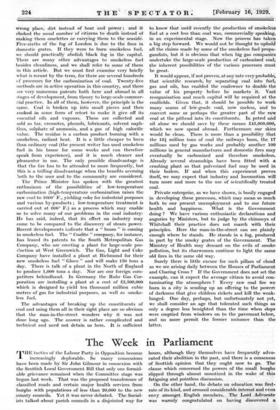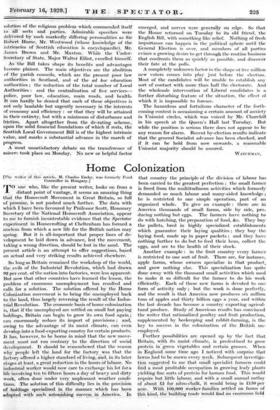The Week in Parliament
FrIHE tactics of the Labour Party in Opposition become increasingly deplorable. So many concessions have been made by Sir John Gilmour in connexion with the Scottish Local Government Bill that only one formid- able grievance remained when the Committee stage was begun last week. That was the proposed transference of classified roads and certain major health services from burghs with populations of less than 20,000 to the new county councils. Yet it was never debated. The Social- ists talked-about parish councils in a disjointed way for hours, although they themselves have frequently advo- cated their abolition in the past, and there is a consensus of Scottish opinion that they ought now to go. The clause which concerned the powers of the small burghs slipped through almost unnoticed in the wake of this fatiguing and pointless discussion.
On the other hand, the debate on education was first- rate of its kind, and aroused considerable interest and even envy amongst English members. The Lord Advocate was warmly congratulated on having discovered a solution of the religious problem which commended itself to sects and parties. AdMirable speeches' were deliVered by 'such markedly differing:Personalities' as Sir RObert Horne; Mr. WestWood (whose knowledge of the intricacies of Scottish education is encYelopiedic);_ Mi. James Brown and. Mr. Maxton, While the Under-. Secretary of State, 'Major Walter Elliot excelled. himself.
As the Bill takes shape its benefits and advantages become plainer. The main objectives are the abolition of the parish councils, which are the present poor law authorities in Scotland, and of the ad hoc education "authorities ; the reduction of the total number of Local Authorities : and the centralization of five services— police, poor law, education, main roads, and health. It can hardly be denied that each of these objectives is not only laudable but urgently necessary in the interests of economy and efficiency : or that they will be attained in their entirety, but with a minimum of disturbance and friction. Apart altogether from the de=rating scheme; Upon the solid financial foundations Or which if rests, the Scottish Local Government Bill is of the highest intrinsic Value, and marks a substantial advance in the march of progress.
A' most unsatisfactory debate On the transference of miners took' place on Monday: No new or helpful factor emerged, and nerves were generally on edge. So that the House returned on Tuesday to its old friend, the English Bill, with something like relief. Nothing of fresh importance can happen in the political Sphere' until the General Election is over, and. members of all parties evince a growing desire to get through the routine business that confronts them as quickly as possible, and discover their fate at the polls. A completely unknown factor in the shape of five million new voters comes into play just before the election. Most of the candidates will be unable to establish any sort of contact with more than half the electorate. And the wholesale intervention of Liberal candidates is a further disturbing feature of the situation, the effect of which it is impossible to foresee.
The hazardous and fortuitous character of the forth- coming contest is occasioning a certain amount of anxiety in Unionist circles, which was voiced by Mr. Churchill in his speech at the Queen's Hall last Tuesday. But while the position is serious there does not appear to be any reason for alarm. Recent by-election results indicate that the general Socialist advance has been checked, and if it can be held from now onwards, a reasonable Unionist majority should be assured.
WATCHMAN.











































 Previous page
Previous page